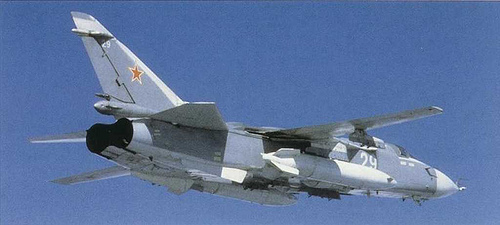
Su-24 fighter bomber, Sept. 26, 2009 (photo: AereiMilitari.org)
Russia’s use of these precision weapons in actual combat has been minimal, however, and some analysts believe Moscow has different motives in trying to convince the world otherwise. “Using precision-guided munitions are more expensive than traditional gravity bombs, and Moscow may prefer to lose some precision in its airstrikes to save money on what is an already expensive military intervention in the Middle East,” said Jorge Benitez of the Atlantic Council.
Putin, Benitez added, may also believe that exaggerating how often Russia is using precision weapons makes it easier to deflect Western criticism about civilian deaths on the ground, regardless of whether he’s making any serious effort to cause them.
One more capability that the Syria deployment — however modest — has brought to light is the ability of the once lethargic Russian military to do multiple things at once. “Russia’s air force has been buying more airplanes than any Western country, and its pilots flying more hours” than any other country in Europe, [Wilson Center scholar Michael] Kofman said.
[T]he majority of Russian strikes [in Syria] have used older “dumb” bombs that can't actually be guided to their intended targets — and are not guaranteed to come anywhere close to hitting them.